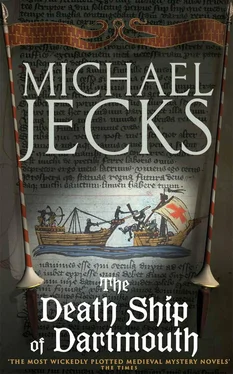Michael Jecks - The Death Ship of Dartmouth
Здесь есть возможность читать онлайн «Michael Jecks - The Death Ship of Dartmouth» весь текст электронной книги совершенно бесплатно (целиком полную версию без сокращений). В некоторых случаях можно слушать аудио, скачать через торрент в формате fb2 и присутствует краткое содержание. Год выпуска: 2014, ISBN: 2014, Издательство: Headline, Жанр: Исторический детектив, на английском языке. Описание произведения, (предисловие) а так же отзывы посетителей доступны на портале библиотеки ЛибКат.
- Название:The Death Ship of Dartmouth
- Автор:
- Издательство:Headline
- Жанр:
- Год:2014
- ISBN:9781472219824
- Рейтинг книги:4 / 5. Голосов: 1
-
Избранное:Добавить в избранное
- Отзывы:
-
Ваша оценка:
- 80
- 1
- 2
- 3
- 4
- 5
The Death Ship of Dartmouth: краткое содержание, описание и аннотация
Предлагаем к чтению аннотацию, описание, краткое содержание или предисловие (зависит от того, что написал сам автор книги «The Death Ship of Dartmouth»). Если вы не нашли необходимую информацию о книге — напишите в комментариях, мы постараемся отыскать её.
The Death Ship of Dartmouth — читать онлайн бесплатно полную книгу (весь текст) целиком
Ниже представлен текст книги, разбитый по страницам. Система сохранения места последней прочитанной страницы, позволяет с удобством читать онлайн бесплатно книгу «The Death Ship of Dartmouth», без необходимости каждый раз заново искать на чём Вы остановились. Поставьте закладку, и сможете в любой момент перейти на страницу, на которой закончили чтение.
Интервал:
Закладка:
‘It’s not my fault,’ the paver was grumbling on. ‘The fool should have seen the barrier.’
‘What barrier?’ Ivo demanded.
‘I had trestles and timber set up to stop anyone falling in — I’m not stupid!’
Ivo glanced about them. ‘There’s only the one trestle, so far as I can see. Where’s the rest of the stuff, if you were so careful to put it all up? Because if you can’t produce it, the Coroner’s going to assume that you are lying, and that you put this man’s life in danger.’
‘Someone must have stolen them!’
‘Really? I wonder if the Coroner’s going to believe that. If no one else saw them, you’ll be fined heavily.’
‘I saw them, Sergeant.’
Ivo snapped his head around, but Hamo was already grinning to himself. He recognised that voice.
‘Ah. Morning, Bailiff,’ Ivo said warily.
The Saint John was sound at the waterline and below. That much was clear enough. The flames hadn’t caught hold completely.
Henry Pyket was a good shipwright, and he had experience of rescuing cogs which had been badly damaged either in battle or foul weather. First, and most important, was to view the exterior and see whether the vessel was still seaworthy. His concern was to have her beached quickly for safety if necessary, but if she was not too badly damaged, and he could have her looked over at leisure, then so much the better. He was busy with other work to complete just now.
Henry was the first shipwright on the scene, by good fortune. As soon as the ship had started up the river towards the haven, one of his carpenters had called him to look at her, and he had realised that there could be money in a job with this one. He’d shouted for a rowing boat and two men and was leaving the jetty even as Hawley’s cog, the Christopher , dropped anchor.
Hawley was in his own boat and on his way to meet Henry in a few moments. As soon as they were within hailing, Hawley gave a shout and his four oarsmen lifted their oars and drifted. The nearer man glanced over his shoulder to gauge the distance, and then let his oar drop to push Henry’s boat gently away before they could collide.
‘We found this cog floating without a crew,’ Hawley called. ‘Can you give her a good look-over? I don’t want the cargo lost.’
‘At once.’
If there was any risk of her sinking, Henry needed to get the ship out of the water as soon as possible so the cargo could be saved. On a cog this size, there could be enough to make a good profit for all involved in the salvage.
From this initial glimpse, he reckoned that she was safe enough. The smell of burned pitch and scorched wood was very strong, though, and he wrinkled his nose as well as his brow as he rubbed his chin reflectively. ‘Take us nearer.’
As the oarsmen heaved, Henry opened his jack. The breeze was cool, fresh off the sea, but the sun was blazing down on them from between the clouds, and he was feeling hot. He pulled off his cowl and scratched at his thin, lank hair, idly pushing his head into his cowl again as they slowly encircled the ship and he could see her from every angle, until he snapped an order, and they rowed in to the ship’s sides. There, he studied the strakes closely, peering at the caulking, reaching out and feeling for himself how well she was coping. When he nodded to himself, he heard a snigger from behind him.
‘You concentrate on your oars, Jankin.’
‘She’s riding low. Must have a good cargo aboard,’ Jankin said, ignoring him.
‘Perhaps.’ Henry couldn’t be bothered to argue with his son today. Better that he should concentrate on the cog herself.
A small ship, this. But then few ships in this part of England were large. There were none of the great vessels which a man could see down south in Castile or even over in Yarmouth on the east coast. Some there were at least 200 tuns, using the standard measure. All ships were assessed in terms of how many standard Gascon ‘tuns’ they could carry. Each of the enormous wine barrels weighed somewhere in the region of a ton, and they provided a handy measure against which to assess ships.
From the look of her, this ship would hold twenty or so tuns. Master Hawley’s ships were all about forty tuns, like the Christopher here, but Master Pyckard, another local merchant and shipowner, liked smaller ones that could navigate the smaller ports, saying that they could hurry over the seas, empty themselves speedily, and return. He had three of them, the Saint John , the Saint Simon , and the Saint Denis . There had been one more, the Saint Rumon , but she had sunk some fifteen years ago, when there had been a sudden squall.
Poor old Paul — he had lost his treasure, his beautiful young wife Amandine, in that freak storm. Never been the same again since, really.
‘Master Hawley did say she was carrying a lot,’ Jankin persisted. ‘Look how low she is in the water, Father.’
The young man’s voice held that hint of greed familiar to all those who eked a living at the coast. While they lived in fear of the sea, they depended upon it too, and although sometimes it could rise up and destroy them, at other times it would bring them a generous harvest. A single shipwreck could supply enough to maintain an entire community for months. Here, safe in the haven, they rarely found wrecks from the sea, but when a good seaman like John Hawley captured a prize, the effects would ripple through the town.
‘I heard him. Let’s just make sure she’s safe first,’ Henry said, eyeing the sheer above his head and shaking his head. It made no sense that a man would attack a ship, kill the crew, and then leave the valuable craft with all her cargo aboard. What kind of a fool would do that?
Henry Pyket was a heavy-set man of almost forty, with a great pot-belly, his tanned face square and kindly, with oddly gentle eyes. Few men in charge of a good-sized shipbuilding business were known for their generosity and charity, but Henry had always been different.
Taking a grappling iron, he swung it contemplatively in his right hand, the one which was missing two fingers, before hurling it aloft. It snagged, and he tugged, but it came free and rattled over the decking, from the sound of it, until he saw the top spike appear over the sheer. Then it gripped as he put his weight on the rope, and he nodded to the oarsmen as he stepped forward, and hauled himself upwards, his legs walking him up the strakes to the sheerline.
Once there, he clambered over with the ease and skill of a sailor, standing on the blackened decking and gazing about him.
‘Begin at the bottom,’ he muttered to himself. That was the rule which his master had always stressed when he was still an apprentice, and he was strongly reminded of it now. Then, he and his master had been surveying a French hulk, and although they did not know it at the time, the hull was sorely stressed and damaged. From above, it looked fine: the line of the decking was straight enough, the mast stood firm in her rigging, and she rode high enough in the water, but when they went into the hold and saw the water slopping about, they understood that the strakes were dangerously loosened, and that they must either stabilise the leaks or evacuate her quickly.
This one was riding smoothly enough, just rising gently on the swell, and he felt hopeful that they would not have to do too much to keep her cargo secure. He walked to the coaming before the hold, and glanced over the edge. Barrels and bales moved about, and he could hear the sloshing of water, but there was no great invasion, so far as he could see. It was only the very bottom that was truly wet. Still, best to be sure.
There was a ladder, and he gripped it firmly, looking around. All about him up here was blackened. Much of the decking would need to be ripped up and replaced. He wasn’t sure if the damaged mast would survive a strong blast. Best replace that too, just in case. In the prow lay a filthy mess of blackened canvas, and thin wisps floated about every so often as the wind caught them: burned sails. There were metal rivets and shreds of leather about the place, too. It was almost as though … but that would make no sense.
Читать дальшеИнтервал:
Закладка:
Похожие книги на «The Death Ship of Dartmouth»
Представляем Вашему вниманию похожие книги на «The Death Ship of Dartmouth» списком для выбора. Мы отобрали схожую по названию и смыслу литературу в надежде предоставить читателям больше вариантов отыскать новые, интересные, ещё непрочитанные произведения.
Обсуждение, отзывы о книге «The Death Ship of Dartmouth» и просто собственные мнения читателей. Оставьте ваши комментарии, напишите, что Вы думаете о произведении, его смысле или главных героях. Укажите что конкретно понравилось, а что нет, и почему Вы так считаете.












